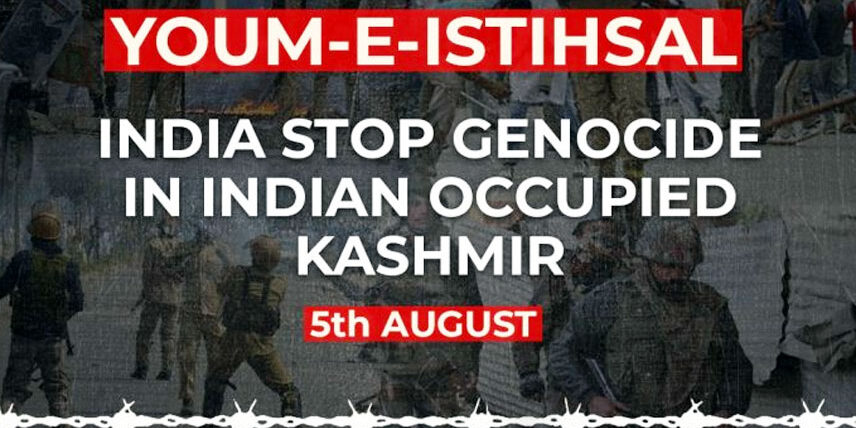Article 370 and 35-A
Legal, Demographic and Humanitarian aspects
Kashmir, a land illegally occupied by India, has been an example of torture and mistreatment since 1948. The hues of terror and constant violations of human rights have made people a victim of disparity, but still there was hope of resolution of the conflict.
India, on August 5th, 2019, deprived the Kashmiri people of their rights and exacerbated the sense of inequality by abrogating the Article 370 and 35-A from constitution of India. This had the importance of backbone for the Kashmiri people as it allowed the state to have autonomy over its own constitution and a separate flag. James R.Crawford in his book “The Creation of States in International Law” highlights the significance of defence, foreign affairs and communications, but in case of Kashmir, these aspects are under the control of India. It slashes the right of autonomy from Kashmir, and whatsoever was left, was violently robbed from the innocent Kashmiris after the revocation of this article. Article 35-A, stemming from article 370 gave special rights to people of Kashmir, including the right to property and ownership, educational scholarships and government jobs. This right was also snatched from the grieved people, leaving them in agony.
Looking from the legal perspective, abrogation of these articles contradicts many international laws. It is an open violation of Universal Declaration of Human Rights (UDHR) as their freedom of thought and expression are undermined. International Covenant on Civil and Political Rights (ICCPR) stresses upon the supremacy of Human liberty, but equality in Kashmir is unfortunately served with corrupted scales. The 4rth Geneva Convention, Security council resolutions, peace accords, but all deliberately shattered by the government of India. The principle of Self-determination that is ingrained in the framework of United Nations Charter is nowhere to be found in Kashmir. The abrogation of these articles is directly linked to denial of right of self-determination to Kashmiri people, as the United Nation had maintained the status of Kashmir as a disputed region, and any change in its status without the verdict by people is considered a violation of Human right, which India did on 5th August. The abrogation of these articles can be scrutinized, as it is a constitutional amendment, but it was done by a presidential order and parliament was not taken in consideration. Must to mention that there were no considerations taken by the Government of Kashmir in this matter.
The intentions of India with Kashmir got crystal clear after 5th August. Claiming that India will bring peace and development to region is a joke. Reports speak for themselves as torture, killings, widowed women and orphan children, and gang rape has witnessed a shocking increment. Destruction of standing structure claps for the notion of introducing development. In the foresight, it is meant to cast down Kashmiri people. Depriving them of their right to job and neighboring them with non-locals is a part of long-game to marginalize the Kashmiri. This will alter the state demography of Muslim majority by giving an incentive to non-local Indians to relocate to Kashmir. The language and culture of already troubled Kashmiris will become in danger in near future. Increased population of Hindus in Kashmir will change the population dynamics of the region, and the stance of favour; Muslim majority region will be challenged. The Bharatiya Jantiya Party’s (BJP) extremist policies and notion of “Greater India” are reflected through this action. Gradually changing the regions dynamic will make the accession of Kashmir to India, as an administrative unit easier for Delhi.
The oppressive Indian regime claims that the humanitarian condition is Kashmir has progressed and this step has proved the righteousness of Indian action, but the reality is far off from the claims. Heavy militarization after the dawn of 5th August speaks of India’s ill intentions. Communication cut offs and prolonged curfews, with an increase in intensity of violence and tearing up the Human rights has become the fate of Kashmiris. Violence by the hard-hearted Indian soldiers make the life in Kashmir a misery. It is a high time that Indian government give lessons on ethics of war and leash their soldiers.
Overall, the abrogation of article 370 has been a talk of tables and discussed from every angle. It has further highlighted the wrong doings of India and condition of Human rights in Kashmir all over the world. India, facing slash from international community finds itself in a fit and this step will cause serious repercussions for India. The government of India has lost its footing over Kashmir case, owing to this step, and multi-facetted opinions in favor and opposition of Governments decision are uprising from India. This has even made India to shift its policy matter over Kashmir, now stating it as “internal affair”. The government of Pakistan strongly castigate India’s action over this occurrence and fully supports the people of Kashmir in their fight for their right. Whatsoever tactics India may adopt, culturally, religiously and politically Kashmiris will vouch for Pakistan.
The writer Jawad Hassan is an Intern at YFK- International Kashmir Lobby Group, and a student of Government and Public Policy at NDU.
- January 26: Kashmir’s Black Day - January 26, 2026
- Unfulfilled Promise of Self-Determination in IIOJK - January 22, 2026
- Socio-Economic Transformation in Kashmir, Post-Article 370: Never Ending Anxieties Of Kashmiris - December 23, 2025







